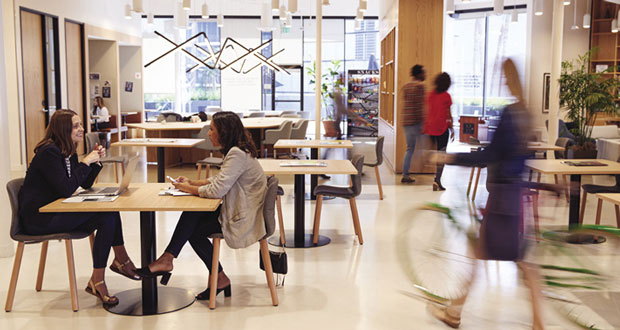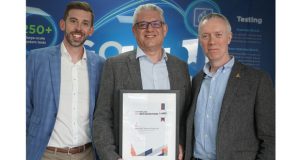Companies are unprepared for the structural shift to hybrid working and must do more to create responsible, personalised and experiential workplaces, a new report from JLL reveals. Intensive experimentation and piloting are needed to achieve hybrid working models that will deliver a unique workplace experience for all.
JLL’s research shows that globally organisations are looking to continue flexibility for where and when people work with 82 per cent expecting employees to work remotely into the future at least part of the time – spending on average two days every week away from the office. Yet 48 per cent of organisations in Europe, Middle East and Africa (EMEA) still have not developed a future of work programme to meet the rising demands and expectations of their staff for greater work flexibility, exceptional and sustainable workplaces and increased wellbeing.
Greater work flexibility
With the global talent shortage showing no sign of slowing, companies slow to integrate flexible working models risk missing out on skilled workers. Eighty-eight per cent of the workforce now want to choose their working hours in the future. Flexible and agile workplace structures that empower remote, hybrid and cross-border teams will help ensure companies compete and retain talent in today’s tight labour market.
Organisations will also have to calculate the right level of technology investment as we move to a hybrid model. The imperative will be to keep people connected, whether they are working in the office or at home, and to create that sense of connectivity.
“Hybrid is here to stay and it’s now up to organisations to integrate and optimise flexible working into their future of work programmes,” says Mark Caskey, EMEA CEO Work Dynamics, JLL. “Today’s employees want more: technology that keeps them connected, buildings that are truly sustainable and employers that prioritise their health and wellbeing. Forward-thinking organisations have already stolen a march on the rest of the competition by seeking to address this trend now.”
Sustainable workplaces
According to JLL, translating sustainability targets into credible action plans will drive real impact from real estate in 2022 , adding there can be no excuses for any delay in meaningful action. Over 80 per cent of occupiers say the link between corporate real estate and sustainability is now a board-level agenda item. Demonstrating responsibility and tangible social impact is also increasingly important to corporate strategy with 82 per cent of occupiers expecting that employees will demand green, sustainable places.
Despite seeing value in driving down carbon emissions and accelerating the race to net zero, JLL says the action plans of many occupiers are still in nascency, with 43 per cent reporting they are only in the early stages of defining what they are going to do. Worse still, another 9 per cent are not sure where to start.
“Sustainability must be at the top of the corporate priority list. Organisations are motivated to act responsibly towards employees, communities and society at large. We’re now in an era of responsible real estate,” says Tom Carroll, EMEA Head of Research and Strategy, JLL. “COP26 confirmed the scale of the challenge and if I was to pick one trend that will have the deepest and most lasting change in our industry, it would be sustainability and the rise of ESG.”
Employee wellbeing
Organisations were stepping up their focus on health and wellbeing before the pandemic, but employee wellness should now be on the roadmap of every company. JLL’s Perspectives for Enterprises report shows that employees expect organisations to have a more supportive environment ready for them when they do go into the office.
As the pandemic has rolled by, employees have found the ability to integrate wellbeing into their daily routines. And they want to migrate this experience to the workplace in a post-Covid world. JLL found that 73 per cent of the workforce want an organisation to promote healthy lifestyles and wellbeing.
Nearly half of employees (45 per cent) want relaxation spaces in the workplace, above outdoor spaces, fitness centres and on-site clinics. But there is a gap between expectations and the services on office. Only 17 per cent have access to such a service in their current workplace.
“We’ve talked about wellbeing of the workforce before. It remains one of the top priorities of employees yet a third don’t have access to such an offering in the workplace,” says Caskey. “Organisations that create truly regenerative workplaces that make their people feel safe, energised and motivated will have an edge. Spaces for collaboration and socialisation, relaxation, as well as healthy food and outdoor spaces present the biggest opportunities for employers to support their workforce.
“Covid plunged all of us into the ‘great work experiment’. We all had to learn quickly, adapt and adjust to the explosion in hybrid working and embrace different ways of engaging with our people, clients and partners. By seeing the trends shaping the future of work, organisations can be more confident in creating the right strategy for their business and the workforce they depend on.”
FMJ & Advetec are on a mission to help FMs accelerate their NetZero plans – but it’s a process that must first start with lifting the blindfold, challenging the waste supply chain, being accountable and making great user of technology.
On the 26th January at 11am FMJ & Advetec are holding a webinar on how biotechnology can help FMs achieve their sustainability goals and reduce food waste.
FMJ Editor, Sara Bean, will be joined by:
- Dr Stephen Wise, Chief Strategic Development Officer, Advetec
- Rochelle Gee, Head of Property Services, Buckinghamshire Healthcare NHS Trust
- Ray Parmenter, CChem MRSC, MCIWM, CIWM: Head of Policy and Technical
- Chris Havers, Programme Director Acclaro Advisory & SFMI
Together they will discuss:
- The role of the circular economy in helping cut carbon emissions.
- Challenges and opportunities for FMs in managing waste to meet environment, social and governance (ESG).
- How the latest technology is available to help.
Click here to register.





